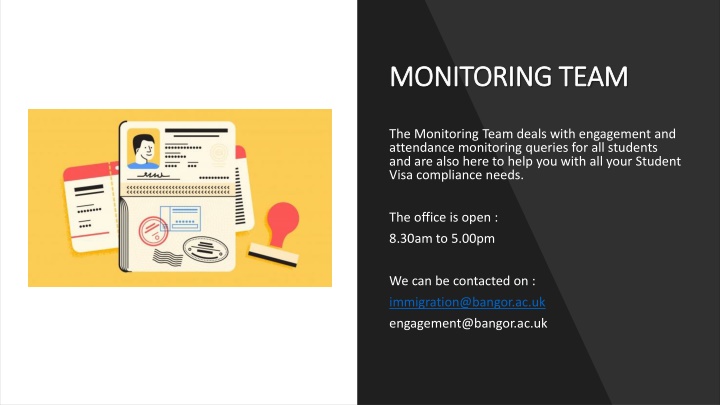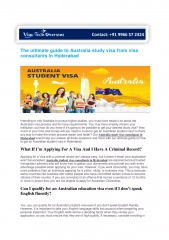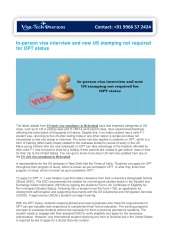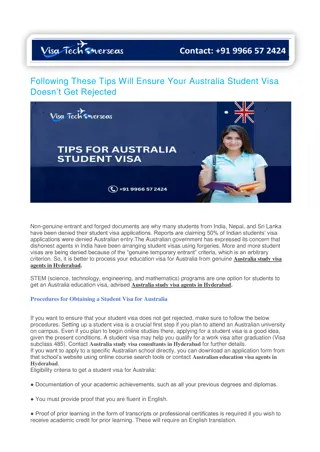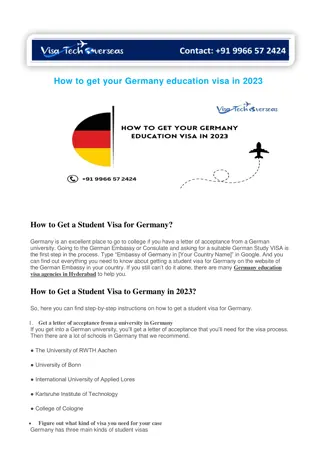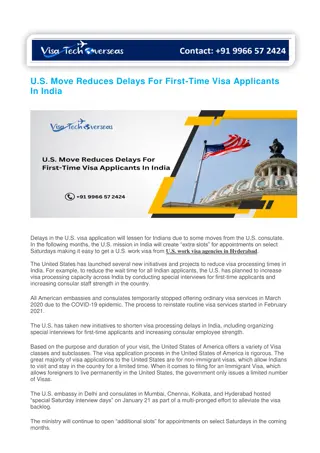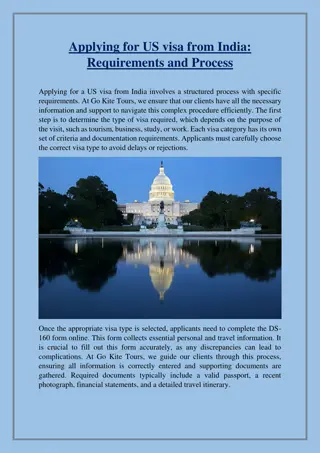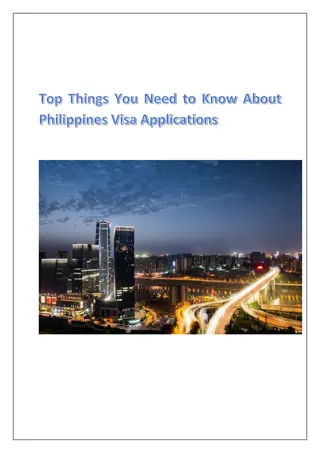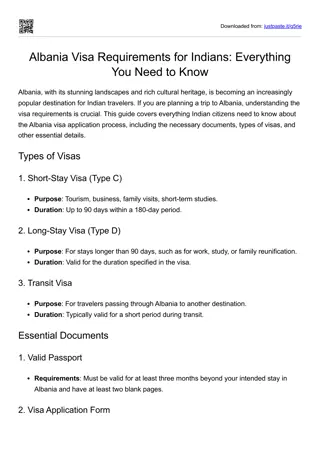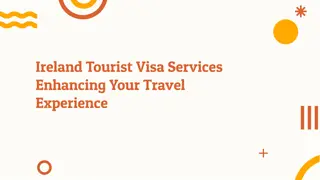Student Visa Compliance Guidelines at Bangor University
The Monitoring Team at Bangor University assists students with engagement, attendance monitoring, and Student Visa compliance. The university must adhere to UK Visas and Immigration requirements, and students have responsibilities regarding attendance, residency, and fee payment. Ensure adherence to rules and regulations for a successful student experience. Contact immigration@bangor.ac.uk for assistance.
Download Presentation

Please find below an Image/Link to download the presentation.
The content on the website is provided AS IS for your information and personal use only. It may not be sold, licensed, or shared on other websites without obtaining consent from the author.If you encounter any issues during the download, it is possible that the publisher has removed the file from their server.
You are allowed to download the files provided on this website for personal or commercial use, subject to the condition that they are used lawfully. All files are the property of their respective owners.
The content on the website is provided AS IS for your information and personal use only. It may not be sold, licensed, or shared on other websites without obtaining consent from the author.
E N D
Presentation Transcript
MONITORING TEAM MONITORING TEAM The Monitoring Team deals with engagement and attendance monitoring queries for all students and are also here to help you with all your Student Visa compliance needs. The office is open : 8.30am to 5.00pm We can be contacted on : immigration@bangor.ac.uk engagement@bangor.ac.uk
Introduction All students must adhere to the University s rules and regulations as these are linked to the Home Office rules for students with a Student (Tier 4) Visa. You will have been informed of these rules and regulations prior to your arrival at the University. Speak to the Monitoring Team if you need further information.
The University must adhere to the following requirements, which are set by UK Visas and Immigration: Keep accurate contact details for student who have a Student Visa (Tier 4). Only issue CAS numbers to students who are capable of completing their chosen course. Only issue CAS numbers to students who are eligible to complete their course within the time limits permitted on their Student (Tier 4)Visa. Retain scanned copies of passports, visas/BRP cards, Matriculation, Financial Guarantees/Certificates and ATAS certificates for students who hold a Student Visa (Tier 4) according to the University s Record Retention Schedule. Only accept students with a valid Student (Tier 4) Visa or valid application for a course at Bangor University, or accept other visa types or applications where these permit study in the UK. Monitor students attendance and engagement with their academic programme. Provide UKVI with the details of any third party, in the UK or another country, which has helped it to recruit students (overseas agents). The University s Responsibilities
These are your main responsibilities Attendance : Students must attend ALL timetabled events and if you are unable to do so due to mitigating circumstances e.g. illness, you must place a note on My Bangor. If you are unsure how to place a note on My Bangor then please contact us, and a member of the Team will be happy to help you. Residency : According to the University s rules students must live within an hour travelling distance of Bangor, this will ensure that you have the best student experience possible and will have access to the numerous facilities at the University. The Student s Responsibilities Payment of Fees : for Student Visa holders this includes both Tuition fees and, if you are staying in the University s Halls of Residence, Halls fees. You will need to pay 50% of your fees prior to your arrival in Bangor and, on arrival you need to set up a Payment Plan with our Finance Office for the outstanding balance. Home Students tuition fee payments will be processed by the SLC.
You will need to complete your online student registration (you will have received an e-mail from the University with the details). If you have not received an e-mail, please contact registration@bangor.ac.uk who will re-issue the details. Once this is complete you will need to attend one of the Registration events at the university. If you are unable to do this you will need to complete an ID Check with a member of the Monitoring Team please contact us to arrange this. Please note: will expect you to have set up a payment plan with the Finance Office prior to undertaking your ID Check. During the current Covid-19 crisis other arrangements may be in force please contact immigration@bangor.ac.uk to confirm the arrangements if you haven't already been notified. Please bring the following documents with you to your ID Check : Passport Stamped Vignette Your Home Office letter informing us where your Biometric Residency Permit (BRP) card should be picked up A copy of your payment plan agreement (you will not need to produce this if you have already paid your fees) Proof of address within the Bangor area which may include your Landlord/Tenancy Agreement If you are a PGT/PGR or PhD student, then you will need to show us your original certificate from your previous University On Arrival
ATTENDANCE Attendance at lectures is now monitored by an online University system. Students are asked to log in during timetabled events using a PIN system which automatically uploads your attendance into My Bangor. Monitoring Team, module tutors and students can view this data later that day. Students can record reasons for not attending e.g. illness or other mitigating circumstances on MyBangor. Undergraduates Data on undergraduate students is monitored on a regular basis and, in line with the University s Academic Engagement Policy , automatic emails generated by the University s system are sent to students on Stage 1 or 2, attendance issues which are higher that a Stage 2 will result in an email from the Monitoring Team and you will be expected to attend a meeting to discuss your lack of attendance/engagement. PGT PGT attendance is monitored on a regular basis. Students who fail to attend timetabled events in line with the University s Academic Engagement Policy will receive automatic emails generated by the University s system flagging their non-attendance. Students are advised to meet with their Personal Tutor if they are experiencing difficult circumstances. The Personal Tutor will record this on My Bangor which the Monitoring Team can also view. Students who continue to miss lectures etc will be contacted by the Team to attend formal meetings to explain their reasons for non-attendance. PGR/PhD Supervisors must meet their Postgraduate Research Candidates at least once every two weeks. Where a meeting cannot be arranged, an alternative contact method must be used e.g. contact through email, Skype etc. These meetings, and all other alternative contact points, must enable the Principal Supervisor to confirm that the candidate is committed to the programme of study. Each meeting/contact point must be recorded, as required by the University s Academic Engagement Policy.
About the Team Contact Us Information for Staff Frequently Asked Questions? Staff Briefing Sessions Student (Tier 4)
TEAM MEMBERS TEAM MEMBERS The University s Monitoring and Immigration Officer is Lynne Hughes. Lynne manages the Monitoring Team and can be contacted on : For Home/EU and International Student Enquiries please contact: For Postgraduate Research Student Enquiries please contact: Sian Lewis Sian undertakes attendance monitoring of Home/EU and International Undergraduate and Postgraduate Taught students. She can be contacted on : Bronwen Hayes Bronwen undertakes the attendance monitoring of all Postgraduate Research and PhD students. She can be contacted on : Immigration@bangor.ac.uk engagement@bangor.ac.uk
What are E-Gates Other types of Visas Can I change my course? Frequently Asked Questions For Student Visa Holders Can I change to another UK University? Can I apply for a DES? TB Testing What courses require an ATAS Certificate? Academic Progression Study and Time Limit Extensions New CAS for Continuing Students
Student (Tier 4)Visa holders SHOULD NOT go through eGates as you will need your Vignette date stamped as proof of entry into the UK, if this not stamped, then you will need to provide proof of your date of entry into the UK e.g. boarding pass. There are over 250 eGates in place at 15 air and rail ports in the UK to enable quicker travel into the UK. You can normally use eGates if you: have a biometric symbol on the cover of your passport are aged 12+ (12 to 17 year olds must be accompanied by an adult) E-Gates are either: a British citizen a national of an EU country, Australia, Canada, Iceland, Japan, Liechtenstein, New Zealand, Norway, Singapore, South Korea, Switzerland or the USA a member of the Registered Traveller Service Those travelling with ID cards cannot use the eGates.
Visitors Visa Ancestry Visa Other Types of Visas The Standard Visitor visa has replaced the: You must prove that you: Family Visitor visa are 17 or over General Visitor visa have enough money without help from public funds to support and house yourself and any dependants Child Visitor visa can and plan to work in the UK Business Visitor visa, including visas for academics, doctors and dentists You must also show that you have a grandparent born in one of the following circumstances: Sports Visitor visa in the UK, including the Channel Islands and the Isle of Man Entertainer Visitor visa before 31 March 1922 in what is now Ireland Prospective Entrepreneur visa on a British-registered ship or aircraft Private Medical Treatment Visitor visa You can claim ancestry if either you or the relevant parent: Approved Destination Status (ADS) visa were adopted You can come to the UK as a Standard Visitor: were born within or outside marriage in the UK for tourism, for example on a holiday or to see your family and friends You cannot claim UK ancestry through step-parents. for certain business activities, for example attending a meeting to do a short course of study to take part in research or an exchange programme as an academic for medical reasons, for example to receive private medical treatment You may not have to apply for a visa. What you need to do depends on your nationality and what you plan to do in the UK.
Dependent Visas Start Up and Innovator Visas Other Types of Visas You will need a family visa to live with a family member in the UK for more than 6 months. You can apply for a Start-up visa if: you want to set up a business in the UK you re from outside the European Economic Area (EEA) and Switzerland If you are outside the UK You can apply for a family visa to live with your: you meet the other eligibility requirements Getting Endorsed spouse or partner You must be endorsed by an authorised body that is either: fianc , fianc e or proposed civil partner a UK higher education institution child a business organisation with a history of supporting UK entrepreneurs parent relative who ll provide long-term care for you You must be able to show that your business idea is: a new idea - you cannot join or invest in a business that is already trading If you re visiting the UK for 6 months or less, check if you need a Standard Visitor visa or Marriage Visitor visa. innovative - you must have an original business idea which is different from anything else on the market viable, with potential for growth
GRADUATE VISA Conditions of permission The Home Office has announced that the new post-study Graduate immigration route will be launched on 1 July 2021. There are specific eligibility requirements, including when you can apply, so you advised to read this information in full. Permission under the Graduate route will be granted subject to the following conditions: no access to public funds; Overview work (including self-employment and voluntary work) is permitted, apart from work as a professional sportsperson; Permission to stay under the Graduate route will enable international students to work or look for work after their studies for 2 years, or 3 years for PhD students. The work can be in any sector and at any level without any minimum salary requirements or the need for visa sponsorship. Students will need to make an application in the UK to be granted permission under the route after successful completion of their degree. study is only permitted on courses that would not meet requirements for student visa sponsorship. The permission granted under the Graduate route, 2 years for undergraduate and Masters students and 3 years for PhD students, will start from when the decision is made on the application. Eligibility requirements It is not possible to extend your permission under the Graduate route. From the Graduate route, you would be able to switch to a Skilled Worker visa from within the UK if you are offered a suitable job with an employer who holds a sponsor licence. To be eligible to apply once the route has launched, you will need to: have studied a Bachelors, Masters, PCGE, or PhD at Cambridge; It is only possible to be granted permission under the Graduate route once. Advanced Diploma, and other non-degree awarding qualifications except the PCGE, are not eligible for the Graduate route. Application costs have successfully completed your degree; The visa fee will be around 700. In addition, the application will also require you to pay the immigration health surcharge and this is charged at 624 per year the visa will be granted. apply in the UK;
There are strict rules about changing courses and you will, in most cases, need to apply for a new Visa. The Home Office guidance is : The Student (Tier 4) Visa guidance states, in relation to a change of course. If you applied for your current leave on or after 6 April 2016, you can only change your course without getting permission from us to start your new course if all of the following apply: your sponsor is an HEP with Student (Tier 4)Sponsor status; your sponsor has a track record of compliance your new course is at degree level or above; your new course is not at a lower level than the current course; you will be able to complete your new course within your current period of leave; if you have previously been granted Student (Tier 4)(General) leave, your sponsor confirms either of the following: - your new course is related to the previous course for which you were granted leave as a Student (Tier 4)(General) Student, meaning that it is either connected to your previous course, part of the same subject group, or involves deeper specialisation - or your previous course and your new course in combination support your genuine career aspirations. Can I Change Course? If you meet the any of the above stipulations and are eligible to change your course, you must complete your new course within your existing period of leave; the only exception to this is if you are applying to re- sit exams or repeat modules or you require further leave because you have previously resat exams or repeated modules for your current course. You will need to provide evidence that you have attempted exams/modules when applying for leave. You will not be allowed to use this provision to undertake part(s) of the course for the first time.
If you wish to study in another University then you will have to return home to make an application directly to that University. We will then have to curtail your Visa and you will be expected to return home. Can I change to another UK University? You will be able to make a new application from home.
The Doctorate Extension Scheme (DES) allows PhD students to extend their Student (Tier 4)visas for up to 12 months to remain in the UK to look for, and engage in, employment. This will be superseded on the 1st July 2021 by the Graduate Visa. Doctorate Extension Scheme
Who Needs to Be Tested? When you have lived for at least six months in a country where TB screening is not required by the UK (including the UK itself) and you have been away from that country for no more than six months, you do not need to be tested for TB. Where you are coming to the UK for more than six months and are resident in any of the below countries, you are required to submit a medical certificate confirming you are free of TB. You must be tested at an approved clinic outlined on the list below. UKVI List of Countries and Approved Clinics You will still require a medical certificate from an approved clinic where: Tuberculosis Testing (TB) You are submitting your visa application in a country that does not require TB testing, but you have been living in a country that does require TB testing for at least six months. You submitted your visa application less than six months after you left a country not requiring TB testing, but you state your intended date of travel to the UK will be more than six months after you left. How to Provide Evidence In your application you must provide evidence of the date you left the UK. Where you are not given an entry stamp in your passport or it is unclear, you can use your boarding pass as evidence. Where you are using your boarding pass as evidence you must outline in your supporting letter or the additional information section of your application that you do not require a TB certificate as you left the UK for less than six months. You should carry your medical certificate in your hand luggage in case you need to present it to an Immigration Officer on arrival in the UK.
Academic Technology Approval Scheme (ATAS) ATAS was introduced to help stop the spread of knowledge and skills that could be used in the proliferation of weapons of mass destruction (WMD) and their means of delivery. Migrants of all nationalities must apply for a clearance certificate online through the Foreign and Commonwealth Office (FCO) website. This site also contains information about the scheme and the list of designated subjects and useful documents to provide with ATAS applications. A Student Visa holder must hold a valid ATAS clearance certificate if they are applying for leave for: postgraduate studies leading to a doctorate or master s degree by research in one of the subjects listed postgraduate studies leading to a taught master s degree or other postgraduate qualification in one of the subjects listed a period of study or research in one of the subjects listed
Doctorate or Masters by Research : Biological Sciences: List of Subjects that need an ATAS Certificate Subjects allied to Medicine: Biology (non-specific) Pharmacology Ecology and Environmental Biology Toxicology Zoology Pharmacy Microbiology and Cell Science Bioengineering, Medical and Biomedical Engineering Plant Sciences Biotechnology Others in subjects allied to Medicine Genetics Biomedical Sciences (non-specific) Molecular Biology, Biophysics and Biochemistry Biosciences (non-specific) Others in Biological Sciences
Veterinary Sciences, Agriculture and related subjects: Mathematical and Computer Sciences: List of Subjects that need an ATAS Certificate Mathematics Others in Veterinary Sciences Operational Research Agricultural sciences Computer Science Physical Sciences: Information Technology Chemistry Information Systems Materials Science Software Engineering Physics Artificial Intelligence Astronomy Others in Geographical Studies Physical Sciences (non-specific) Sciences (non-specific) Natural Sciences (non-specific)
Engineering: Taught Masters Subjects : List of Subjects that need an ATAS Certificate Engineering (non-specific) Materials Science Civil Engineering Physics (including Nuclear Physics) Mechanical Engineering Mechanical Engineering Aeronautical and Aerospace Engineering Aeronautical and Aerospace Engineering Naval Architecture Chemical, Process and Energy Engineering Electronic and Electrical Engineering Chemical, Process and Energy Engineering Minerals Technology Materials Technology Technologies: Polymers and Textiles Minerals Technology Materials Technology Maritime Technology
Academic progression is required for you to be issued a CAS for your new course and determines whether you can apply in the UK for your new Student (Tier 4) Visa. Your application will meet the academic progression criteria if: You are applying for a course at a higher level than your previous course (e.g. applying for a Masters after completing a Bachelor s degree). You are applying for a course at the same level as your previous course (e.g. applying for a second Masters) and both courses are related or both courses combined will support your career goals. Academic Progression You have not completed your previous course but the Admissions Team deems your reason for study valid. Your application will not meet the academic progression criteria if: You are applying for a course at a lower level than your previous course (e.g. applying for a Bachelor s after completing a Masters). You have not completed your previous course and the Admissions Team deems your reason for study invalid.
Extension to complete PhD Once your extension has been approved, you must apply for your visa before your new course end date or your visa expiry date (whichever is sooner). Your new visa expiry date will be: new thesis submission date + 10 weeks + 4 months Submitted thesis and awaiting viva If you've submitted your thesis and awaiting your viva you can either: apply for a Student (Tier 4) Visa extension inside the UK if your Student (Tier 4) Visa is still valid. A CAS can only be issued for this if your expected or actual viva date is still in the future at the time the CAS is issued Study and Time Limit Extensions (PGR) leave the UK before your visa expires and apply for a Short-Term Student Visa to return for the viva Your new visa expiry date will be: current thesis submission date + 10 weeks (or actual viva date) + 4 months Minor (3 month), major (6 month) corrections & resubmission (12 month) without a second Viva You can apply for a Student (Tier 4) Visa extension inside the UK if: If you have received the outcome of your viva before your current Student (Tier 4) Visa expires; and Your new course end date is after your current Student (Tier 4)visa expires Your new visa expiry date will be: new course end date + 4 months Alternatively, you could leave the UK before your visa expires and apply for a Short-Term Student Visa to return to submit your corrections. Resubmission (12 month) with a second viva You can apply for a Student (Tier 4) Visa extension inside the UK if: You have received the outcome of your viva before your current visa expires; and Your new course end date is after your current Student (Tier 4)visa expires Your new visa expiry date will be: resubmission date + 10 weeks (or actual 2nd viva date) + 4 months Alternatively, you could leave the UK before your visa expires and apply for a Short-Term Student Visa to return for the 2nd viva.
Study extension (PGT) If you are a Taught Postgraduate Student and require a study extension to submit your dissertation, please apply through your department for approval. If you are required to have regular meetings with your department and you must remain in the UK to work on your dissertation, please mention this on your application form. Study and Time Limit Extensions (PGT) If the duration of your requested study extension is more than four months, your department must provide the Immigration Team with justification for your extra time. You will only be assigned a CAS if the Immigration Team accept that this as a valid reason. We cannot issue a new CAS to you if: your re-submission date is before your visa expiry date; or you are not required to have regular meetings with your department; and you can re-submit your work from your home country (you must leave the UK and submit online) A study extension does not exempt you from meeting the academic progression requirements. If you make a further Student (Tier 4) Visa application for your existing course, you must apply outside the UK.
Where you are a continuing student, you may require a new CAS if you are: repeating/resitting modules returning from a Leave of Absence New CAS for Continuing Students upgrading to an integrated degree programme continuing a degree course following repeats/resits downgrading from an integrated degree programme a candidate for the Doctorate Extension Scheme (DES) a PhD/MPhil candidate requesting a time extension to submit/resubmit/attend Viva changing to a new degree programme following a Change of Status/Change of Candidature
https://www.bangor.ac.uk/international/sup port/ https://www.gov.uk/tier-4-general-visa https://www.gov.uk/start-up-visa https://www.gov.uk/uk-family-visa https://www.ukcisa.org.uk/ Useful Links
